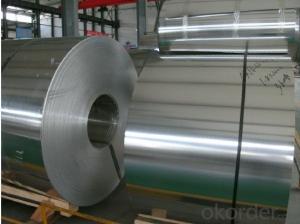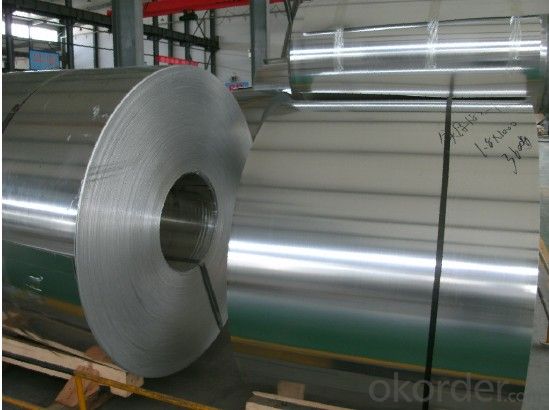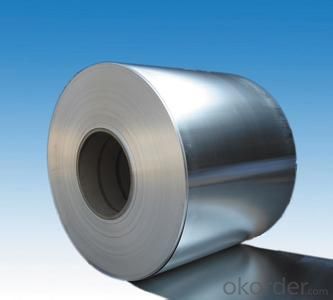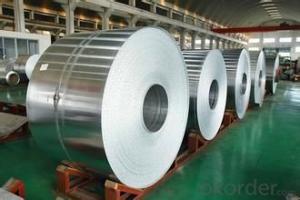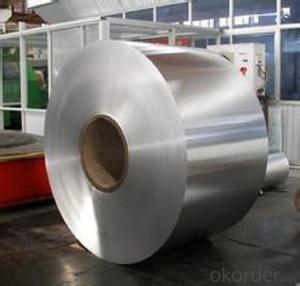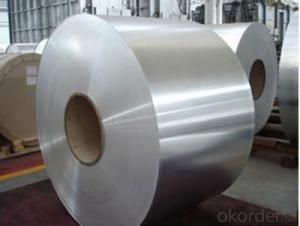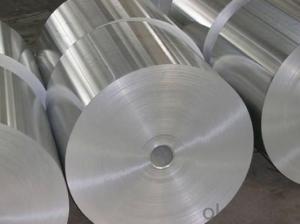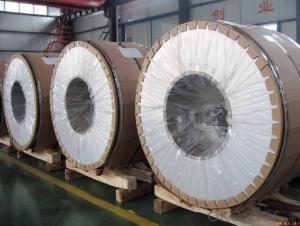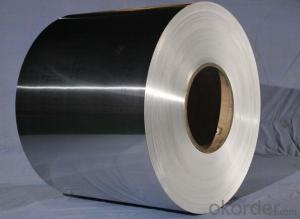Mill Finished Aluminum Coil Material for Secondary Pass
- Loading Port:
- Shanghai
- Payment Terms:
- TT OR LC
- Min Order Qty:
- 5 m.t.
- Supply Capability:
- 1000000 m.t./month
OKorder Service Pledge
OKorder Financial Service
You Might Also Like
Specification
1.Structure of Mill Finished Aluminum Coils for Secondly Pass
Mill Finished Aluminum Coils for Secondly Pass is one semi-finished aluminium material. This strip can be rolled down to aluminium coil,sheet,circle ect. The alloy AA1050 is widly used in building, industry ect. Its weight is much lower than steel. So many customers choosed aluminium material instead of steel.
2. Main features of Mill Finished Aluminum Coils for Secondly Pass
a.Competitive price---We have our own mills and can produce mill finished aluminium coils, so we can control the production cost better.
b.Professional after-sale service---We have more than 15 years exportation experience and you need not worry about the exporation problems.
c.Fast delivery time---We can control the delivery time within 35 days.
3. Image of Mill Finished Aluminum Coils for Secondly Pass
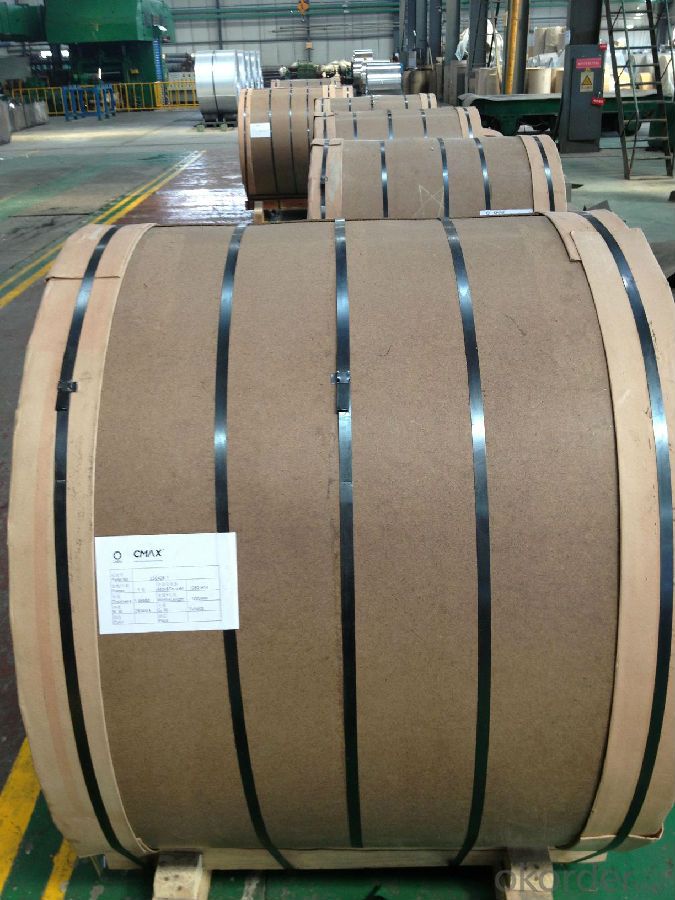
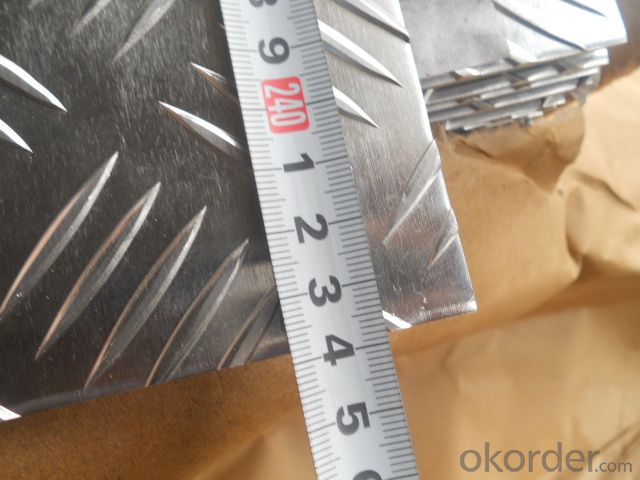
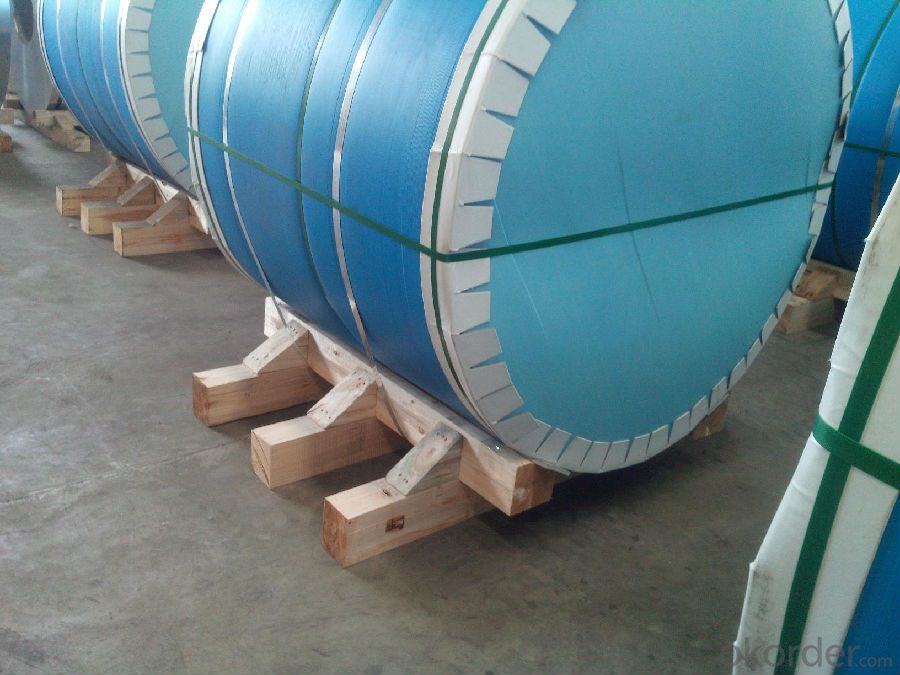
4. Product Specification
| ALLOY | TEMPER | ROLLING | THICKNESS | WIDTH |
| AA1050 | H14 | CONTINUOUS ROLLING | 3MM-5MM | 1000MM-1500MM |
5.FAQ:
What is the quality standard?
---Usually our standard is GB3880-2006
What is the largest width?
---It is 2300mm
What is the MOQ?
---Usually we can accept 80 tons.
- Q: What is the electrical conductivity of aluminum coils?
- Aluminum coils have a relatively high electrical conductivity. Renowned for its impressive conductivity, aluminum boasts a rating of approximately 37.7 x 10^6 siemens per meter (S/m). As a result, aluminum is an exceptional option for a range of electrical uses, particularly in coil production. The exceptional conductivity of aluminum facilitates the efficient transmission of electric current through the coils, rendering them a fitting choice for electrical wiring, transformers, motors, and other electrical apparatus.
- Q: What are the different tensile strengths of aluminum coils?
- The tensile strengths of aluminum coils can vary depending on the specific alloy and manufacturing process. However, common tensile strengths for aluminum coils range from 20,000 to 70,000 pounds per square inch (psi).
- Q: Is there any way aluminum can affect you if its absorbed into your body either by digestion, through an open cut, or even through breathing it in?Most likely inhaling it would surely affect you, but what about the other two?
- Aluminium can accumulate in the brain possibly causing alzheimers. If you inhaled it it would poison you and damage your lungs, if you got it in your body it would damage your skin, possibly cause an infection and the cut might not heal. Aluminium is a solid so how could you accidently get it in your body unless you have been melting it etc? If it wasn't solid it would burn you if you got it on your skin. You can only inhale vapours not a metal. If you ate it then it would probably damage or clog up your insides otherwise just pass out in a stool, depends how much you ate. People eat from aluminium and touch it every day so it is not dangerous to be in contact with.
- Q: What is the maximum temperature aluminum coils can withstand?
- The maximum temperature that aluminum coils can withstand typically ranges from 300 to 500 degrees Fahrenheit, depending on the specific alloy and application.
- Q: This question asks about the environmental effects that aluminum coils may have on the environment.
- <p>The environmental impacts of aluminum coils are multifaceted. Aluminum production, particularly the extraction and refining process, consumes significant energy and can result in greenhouse gas emissions. The mining of bauxite, the primary source of aluminum, can lead to deforestation and habitat destruction. However, aluminum coils are recyclable, which reduces their environmental footprint compared to non-recyclable materials. When recycled, aluminum saves up to 95% of the energy needed to produce new aluminum, reducing emissions and waste. Despite these benefits, improper disposal or incineration of aluminum can still contribute to pollution. Overall, the environmental impact of aluminum coils is complex, with both negative and positive aspects depending on production methods and waste management practices.</p>
- Q: Can aluminum coils be used in electrical cables?
- Yes, aluminum coils can be used in electrical cables. Aluminum is commonly used as a conductor in high-voltage power transmission cables due to its lighter weight and lower cost compared to copper. However, it is important to note that aluminum has higher resistivity than copper, so larger cross-sectional areas are required to achieve the same level of conductivity. Additionally, special connectors and jointing techniques are necessary to account for the differences in thermal expansion and electrical conductivity between aluminum and other materials used in electrical systems.
- Q: This question asks for the current market price of aluminum coils.
- <p>The price of aluminum coils can vary significantly based on factors such as grade, thickness, width, and market conditions. As of my last update, prices fluctuate daily due to global supply and demand, economic indicators, and geopolitical events. For the most accurate and up-to-date pricing, it's best to consult with metal suppliers or check commodity exchanges like the London Metal Exchange (LME). Prices are typically quoted in dollars per metric ton and can range from a few thousand to several thousand dollars depending on the aforementioned factors.</p>
- Q: Are aluminum coils suitable for automotive applications?
- Yes, aluminum coils are suitable for automotive applications. Aluminum coils offer several advantages such as lightweight, high corrosion resistance, and excellent heat conductivity, making them an ideal choice for various automotive components like radiators, condensers, and evaporators. The use of aluminum coils helps improve fuel efficiency, reduce emissions, and enhance overall vehicle performance.
- Q: Can aluminum coils be used in the manufacturing of furniture?
- Indeed, furniture manufacturing can incorporate aluminum coils, which boast attributes of being both lightweight and durable. Consequently, this material is highly suitable for furniture production. Notably, it is frequently employed in the crafting of outdoor furniture due to its exceptional resistance against rust and corrosion. The malleability of aluminum coils permits the creation of furniture pieces in a diverse range of shapes and sizes. Furthermore, aluminum can be effortlessly tailored and adorned with a variety of coatings or paint, enabling it to harmonize with any desired aesthetic. In summary, opting for aluminum coils in furniture manufacturing proves to be a versatile and pragmatic decision.
- Q: Can aluminum coils be used for solar panel applications?
- Yes, aluminum coils can be used for solar panel applications. Aluminum is a lightweight and durable material that is commonly used in the construction of solar panels. It is an excellent conductor of electricity, making it ideal for capturing and conducting solar energy. Aluminum coils can be used as a backing material for solar panels, providing structural support and helping to dissipate heat. Additionally, aluminum has good corrosion resistance, which is important for solar panels that are exposed to various weather conditions. Overall, aluminum coils are a popular choice for solar panel applications due to their strength, conductivity, and resistance to corrosion.
Send your message to us
Mill Finished Aluminum Coil Material for Secondary Pass
- Loading Port:
- Shanghai
- Payment Terms:
- TT OR LC
- Min Order Qty:
- 5 m.t.
- Supply Capability:
- 1000000 m.t./month
OKorder Service Pledge
OKorder Financial Service
Similar products
Hot products
Hot Searches
Related keywords
